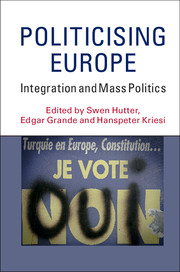Book contents
- Frontmatter
- Contents
- List of figures
- List of tables
- List of contributors
- Preface and acknowledgements
- Part I Theory and methods
- Part II Mapping the politicisation of European integration
- Part III Driving forces and consequences of politicisation
- 6 Constitutive issues as driving forces of politicisation?
- 7 The radical right as driving force in the electoral arena?
- 8 Framing Europe: are cultural-identitarian frames driving politicisation?
- 9 Politicisation, conflicts and the structuring of the EU political space
- 10 The euro crisis: a boost to the politicisation of European integration?
- Part IV Conclusions
- Methodological Appendix: measuring politicisation, benchmarks and data
- Bibliography
- Index
8 - Framing Europe: are cultural-identitarian frames driving politicisation?
from Part III - Driving forces and consequences of politicisation
Published online by Cambridge University Press: 05 March 2016
- Frontmatter
- Contents
- List of figures
- List of tables
- List of contributors
- Preface and acknowledgements
- Part I Theory and methods
- Part II Mapping the politicisation of European integration
- Part III Driving forces and consequences of politicisation
- 6 Constitutive issues as driving forces of politicisation?
- 7 The radical right as driving force in the electoral arena?
- 8 Framing Europe: are cultural-identitarian frames driving politicisation?
- 9 Politicisation, conflicts and the structuring of the EU political space
- 10 The euro crisis: a boost to the politicisation of European integration?
- Part IV Conclusions
- Methodological Appendix: measuring politicisation, benchmarks and data
- Bibliography
- Index
Summary
Introduction
Having shown the importance of constitutive issues and the role of political parties in the previous two chapters, we now turn to another key variable discussed in the scholarly literature as a driving force of politicisation, namely, the framing of European issues. Political actors not only emphasise different issues and adopt different issue positions; they also frame their issue positions differently. In this context, frames are conceived as ‘thought organisers’ (Ferree et al. 2002: 13) which give political issues a specific meaning. Within the constraints of their general ideological predispositions, political actors can strategically construct and promote such frames in order to improve their competitive position in terms of votes, offices and influence (Hänggli and Kriesi 2012). By strategically framing a given issue, actors can shift the central logic of a political conflict.
Statham and Trenz (2013a: 128) distinguish three types of frames: ‘campaigning frames’, which emphasise tactical and strategic considerations; ‘issue-specific frames’, which focus on specific attributes of a political issue; and ‘justification frames’, which ‘aim to resonate with the public by adding political meaning’ (Statham and Trenz 2013a: 128–129) to an issue at stake. For the articulation and mobilisation of political conflict over Europe, justification frames are the most important because they ‘move beyond the assumed party loyalty of campaigning and issue-specific frames and try to win votes by politicising a stance over integration’ (Statham and Trenz 2013a: 129; emphasis in the original).
In short, the question of how Europe has been framed in political conflicts is crucial for an understanding of its politicisation. In the scholarly literature, three arguments in particular have been advanced on the ‘framing of Europe’ (Diez Medrano 2003). First, scholars assume a positive relationship between the importance of cultural-identitarian frames and high levels of politicisation (Kriesi et al. 2008, 2012). This implies an increasing importance of cultural frames in debates on European integration, as formulated in our ‘cultural shift hypothesis’. Hooghe and Marks (2004, 2006, 2009) argue that with the completion of the common market and the introduction of a common currency citizen preferences and public opinion on European integration have to an increasing extent being determined by attachments to national identity rather than by economic rationality. In this context, they distinguish between ‘exclusive’ (nationalist) and ‘inclusive’ (multiculturalist) identities. While inclusive identities welcome cultural openness and supranational political integration, exclusive identities aim at protecting national identity and sovereignty.
- Type
- Chapter
- Information
- Politicising EuropeIntegration and Mass Politics, pp. 181 - 206Publisher: Cambridge University PressPrint publication year: 2016
- 8
- Cited by



